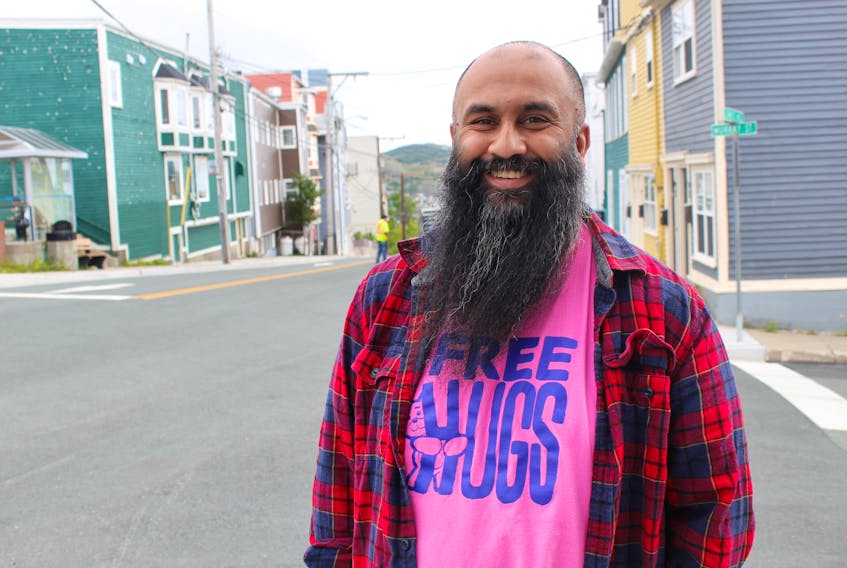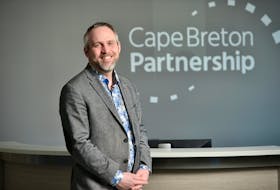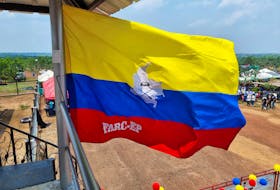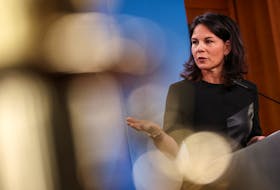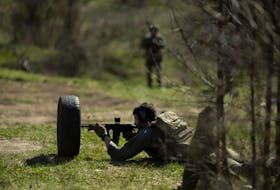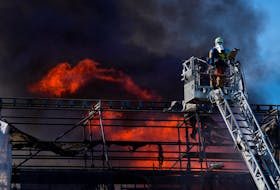ST. JOHN'S, N.L. — You might know him as the bearded merman frequently seen around St. John’s doing good deeds.
Whether it’s shovelling driveways, fundraising for various causes through Merb’ys calendar sales or inviting strangers into his home for Thanksgiving dinner, Hasan Hai seems perpetually busy spreading kindness.
But who is the man behind the beard?

During his lunch break on Friday (yes, he has an actual 9-5 job), Hai greets The Telegram’s Juanita Mercer with a hug. Over coffee at Long’s Hill Cafe & Bookshelf, he insists he’s “just a regular guy who committed to doing some stuff.”
“I wake up feeling like garbage some days. I struggle with all the same things everyone else does. The same demons are at my heels like they are at everyone else.”
He smiles sincerely and strokes his long beard while talking.
He’s clad in a bright pink T-shirt with "Free Hugs" written across the front.
It’s hard to picture Hai in 2013. He describes himself at that time as a man with “a laundry list of bad human traits.”
Hai refers to the meme of the dog sitting in a burning room. The one with the caption that reads, "This is fine."
“You can literally train yourself to ignore everything falling apart around you,” he says.
What? There was a time when Hai wasn’t a literal super-merman?
In 20 Questions, Hai opens up about the difficult moments that made him the person he is today. (Some responses have been edited for length.)
1. What is your full name?
Hasan Ahmad Hai.
2. Where and when were you born?
Lahore, Pakistan, in 1977.
3. Where do you live today?
Mount Pearl.
4. What is your favourite place in the world?
One of my favourite places I’ve lived is actually Squamish, B.C. I was there for about two years. I looked out at mountains out my front window. And come October or so you would start seeing the frost line dropping, and every day it would drop, like, tens of metres or so. But I love where I am right now. I love Newfoundland and Labrador. (Squamish) was one of the most beautiful places I’ve ever been, but I love everything about this province and where I am right now.
5. Who do you follow on social media?
I try to keep it somewhat organic as far as people I know or people of interest, or (people) putting out good content. It could be everything from, like, fun meme accounts making me laugh, or just local people who are doing stuff — the makers and the doers around me.
6. What would people be surprised to learn about you?

7. What’s been your favourite year and why?
I would say 2013. 2013 was the hardest year of my life. I was at a really low point. I was moving away from Newfoundland. I was actually moving away from my kids to take a job to help support them.
So, the story gets better. (Laughs.)
Eventually they rejoined me. We lived in Saskatchewan for a couple of years.
But it was my favourite year because I really had to dig really deep, and face a lot of things about myself that I didn’t like, and had been hiding and suppressing for many years, as far as dealing with feelings and emotions.
And so, it was a year that I started really looking at the world in a different way, and looking at myself in a different way.
It was a first step on the path to bringing me where I am today, doing the things I’m doing in the community and for others. It started in that year.
Q: What do you mean when you say you had to face things you didn’t like about yourself?
I, for most of my adult life, was a person who was very defensive when I was called out on behaviours.
Like, if I was rude to someone. If I was saying hurtful things, like, in relationships. I didn’t take criticism very well as opposed to just pausing and self-reflecting. I wasn’t open to learning and growth.
I also didn’t really have any ambitions beyond I just did my job. … I was generally a very irritable person, I was somewhat short tempered, I was incredibly lazy.
If you had, like, a laundry list of bad human traits — and, so like, hey, there’s Hasan described right there. I don’t think I was an awful person, but I wasn’t a very good one. So, I started reflecting on the person I want to be.
Q: Was the impetus for digging inside yourself the move across the country?
It was a perfect storm of things that happened that year. A few months previous, my marriage had come to an end. It wasn’t a huge surprise to either of us, but it still was a big change. I was living in Clarenville at the time, and financially times were really tough for us. We were in one household, then we were in two. I was socially really isolated. At the same time, I was sort of headhunted for this position in Saskatchewan, which I didn’t want to go, but I needed that money in order to support my family the way that I needed to. … And while I was in transit moving to Saskatchewan, I stopped at my parents’ place in Ottawa and I just had this moment of … I literally looked in a mirror. (Laughs.)
I was looking at myself, and I didn’t recognize this person. It was this crossroads where I’m literally going through a change, moving across the country, I don’t know what the future holds and I can keep living the same really small and limited life that I have been, or I can use this as an opportunity to try and grow in some ways.
I didn’t know what that meant, but it was having the mindset that I can be better than what I am today. It was a moment where I can keep living on the ocean floor, or I can start to try and swim up. So, it was initially just a decision point, and then the work started. I started doing a thing at a time, a step at a time.
So, 2013 was an awful and a wonderful year altogether.
"If you had, like, a laundry list of bad human traits — and, so like, hey, there’s Hasan described right there. I don’t think I was an awful person, but I wasn’t a very good one. So, I started reflecting on the person I want to be." — Hasan Hai
8. What is the hardest thing you’ve ever done?
(Long pause.) I would say making that move. For me, I remember how awful I felt at the prospect of leaving my kids. It was four months and 23 days that I didn’t see my kids, and the first two months or so I wasn’t sure when I was going to see them. I knew of course I would, but it might not have been months. It was a couple of months of trying to be a parent remotely. Obviously, the connection — I was always their father and that never changed — but not really knowing who their friends were, and my kids were very young at the time, so talking to them on the phone was very difficult. … In the back of my head, I knew the reasons I was doing it, which was ultimately I needed … I mean, it’s the story of so many Newfoundlanders and Labradorians: you go away to find work because you need to support your family. And it’s the story of people all across this country and across the world that you make sacrifices. So, yes, I knew that, and I understood the reasons I was doing it, but it was awful. And it got better. My ex and my kids moved to the same city, and then we were together in the same city.
9. Can you describe one experience that changed your life?

I was living in Saskatchewan, and I went to the city of Saskatoon. There was this conference and there was this fellow, Joe Roberts, who was a motivational speaker. He was known as the "Skid Row CEO." He told a story, and the abridged version of it is that he was this kid who, when he was young, was in a family with an abusive step-parent. And he ran away from home, got involved with drugs.
As he was telling the story, he talked about a situation where he sat down at a park bench. I think he traded his shoes for drugs.
So, he’s sitting there with bare feet, and this other fellow, this older guy, wanted to bum a smoke off him or something like that, but he talked to him. And he says to him, "Joe, you’re better than this. You have potential. You don’t need to be here." And he describes that moment as someone who saw value and beauty and potential in him that he himself didn’t see.
That inspired him to start taking steps. … He cleaned up and went back to school, went to university and made millions in the internet industry and now devotes his life to working with at-risk youth and helping them out.
What for me was so telling in that was seeing the potential in people, and assuming the best in them that they themselves may not recognize. … This was at a safety conference of all things, (laughs), and I was just sitting there crying in the back of the room. This guy got to me, and forever changed me. It changed how I view people, and how I talk to people.
10. What is your greatest indulgence?
Milk and cookies. … I will eat cookies by the sleeve, and you add milk to that and it’s like, I will eat it by the wheelbarrow.
11. What is your favourite movie or book?
Favourite book is an older hard science fiction called “Dune” by Frank Herbert. It takes place in the distant future. It’s kind of like “Game of Thrones” in space, and in the future. It’s all about
this nuance of religion and political control of people, and ultimately they’ve given up on technology in some sense, anything that would replicate the mind — computers, basically, have been outlawed. So, they’ve had to retrain their human minds to do the high-end computational stuff because there was wars fought over AI and stuff.
12. How do you like to relax?
I dies for a bit of Netflix. "Thor: Ragnarok" — I’m watching it for the 186th time.
13. What are you reading or watching right now?
Does Facebook count? (Laughs) I have a copy of Mark Critch’s book sitting on my bookshelf which he kindly autographed for me. I’ve opened it, I haven’t yet dove into it, but that’s the next one on my reading list. Oh, no! That’s a total lie. I started “The Life of Pi.” You can tell how often I’m reading when I forgot I’m reading this book.
14. What is your greatest fear?
I come from a moderately religious family, and I was never very spiritual at all. I never believed in God or anything like that. And when you’re in a religious family, there’s a bit of anxiety over that. … As I got a bit older, probably in my 20s, I heard this saying: "The key to life after death is living on in the hearts and minds of others." What that meant for me is just being relevant and meaningful. I don’t have to cure a disease, or become prime minister, but just affecting people in a way that, even though the memory and the identity of me will fade over time, I’ve had some impact. So, conversely, my fear is to be an irrelevant person. To have lived my life and not had an impact on anyone else. … My biggest fear is to waste opportunities in lifting up others, because I have the ability and the power to do so.

15. How would you describe your personal fashion statement?
16. What is your most treasured possession?
Books, probably. I mean, there’s so many memories tied to some old books I have. Not that they have any financial value, but I’ve had some of them for decades.
17. What physical or personality trait are you most grateful to a parent for?
It’s a combination of their endless wells of love — my parents are such loving people, and they’re so well-regarded in their family and circle of friends as being these enormous hearts. Everyone leans on them, and I aspire to be half the person that they are. And also, sense of humour. I come from hilarious people. … So, it’s just always a laugh with them, but they’re so loving, and so kind, and even when I was in my dark times and my dark places there, it was just this unconditional beacon of light and love from them, and so, I’m so grateful to my parents.
18. What three people would join you for your dream dinner party?
Three people I don’t know. I want to meet people I don’t know who have lived experience that I’ve never encountered. I want people I can learn from.
19. What is your best quality?
My hugs. I’ve been told they’re great.
What is your worst quality?
I try to do everything at once. My ambition is greater than my capacity to do things, at times.
20. What’s your biggest regret?
I’m not going to say "no regrets," but I’m happy with my life. There’s aspects that I absolutely love about myself and what I’m doing and there’s things I want to grow in, but I don’t believe in regrets, only because if I were to change anything I wouldn’t be the person I am right now, living the life I am and having the connections I do. Like, any one thing I changed would impact the positive parts of what I have. So, if I had the power to change anything, I wouldn’t. … I don’t really believe in regrets, it’s more like lessons learned.

